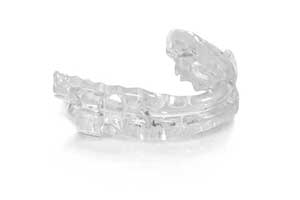
Do Sleep Apnea Dental Appliances Work?
If you’ve been diagnosed with Obstructive Sleep Apnea (OSA) you are probably familiar with a Continuous Positive Airway Pressure (CPAP) machine. CPAP is the most widely used form of treatment for sleep apnea. However, many patients suffering from mild to moderate sleep apnea find that their symptoms can be managed by a custom dental appliance.
If you are having trouble sleeping while using your CPAP machine, or you find that the side effects of CPAP treatment are too overwhelming, you may want to talk with your doctor about a custom dental appliance for treating sleep apnea.
What Are Dental Appliances for Sleep Apnea?
Dental appliances for sleep apnea are used by millions of Americans around the country in place of a CPAP machine. While a CPAP machine utilizes air pressure to help you breathe, a dental appliance simply holds your airways open, allowing air to move naturally through your airways and lungs.
There are two kinds of dental appliances for sleep apnea:
- Mandibular Advancement Devices (MADs)
- Tongue Retaining Devices
Mandibular Advancement Devices are the most commonly prescribed form of dental appliances for sleep apnea. MADs look similar to the basic mouthguards used by athletes, except that they snap over the upper and lower dental arches and shift the lower jaw forward. By adjusting the lower jaw, MADs hold your airway open while you sleep, allowing air to pass freely in and out of your lungs.
Tongue Retaining Devices are less common but still effective. Rather than shifting the lower jaw forward, TRDs are basically a splint that holds the tongue in place. This prevents your tongue from slipping back into your mouth and closing off your airway while you sleep.
Dental appliances for sleep apnea are custom made for each patient. You must order one from a qualified dentist who can properly measure and design the dental appliance so that it fits your mouth perfectly.
Pros of Dental Appliances for Sleep Apnea
- Cost Effective
- Great for Travel and Camping
- More Comfortable to Wear Than CPAP
- Less Equipment Than CPAP
- Fewer Complaints About Dry Mouth, Sore Throat & Irritated Sinuses
- Great for “Active” Sleepers Who Move a Lot During the Night
Cons of Dental Appliances for Sleep Apnea
- Can Be Initial Soreness in Jaw, Teeth and Gums
- Temporary Salivating
- The Muscles Can Relax and Create a Bite Change
- Must Be Custom Fitted
- Are Less Effective Than CPAP for Serious Cases
Who Should Get a Dental Appliance for Sleep Apnea?
CPAP remains the most common and most effective form of treatment for sleep apnea. However, for patients who suffer from mild to moderate OSA, a CPAP machine may not be necessary. If your sleep apnea is not severe, then a dental appliance such as a Mandibular Advancement Device or Tongue Retaining Device may be a better option for you.
Dental appliances for sleep apnea are also an alternative for those patients who simply cannot tolerate a CPAP machine. Even patients with more severe symptoms may be aided by a dental device if they find it impossible to sleep while using CPAP.
If you believe that a dental appliance may work in treating your sleep apnea, talk to your doctor about finding a qualified dentist who can get your custom-fitted.